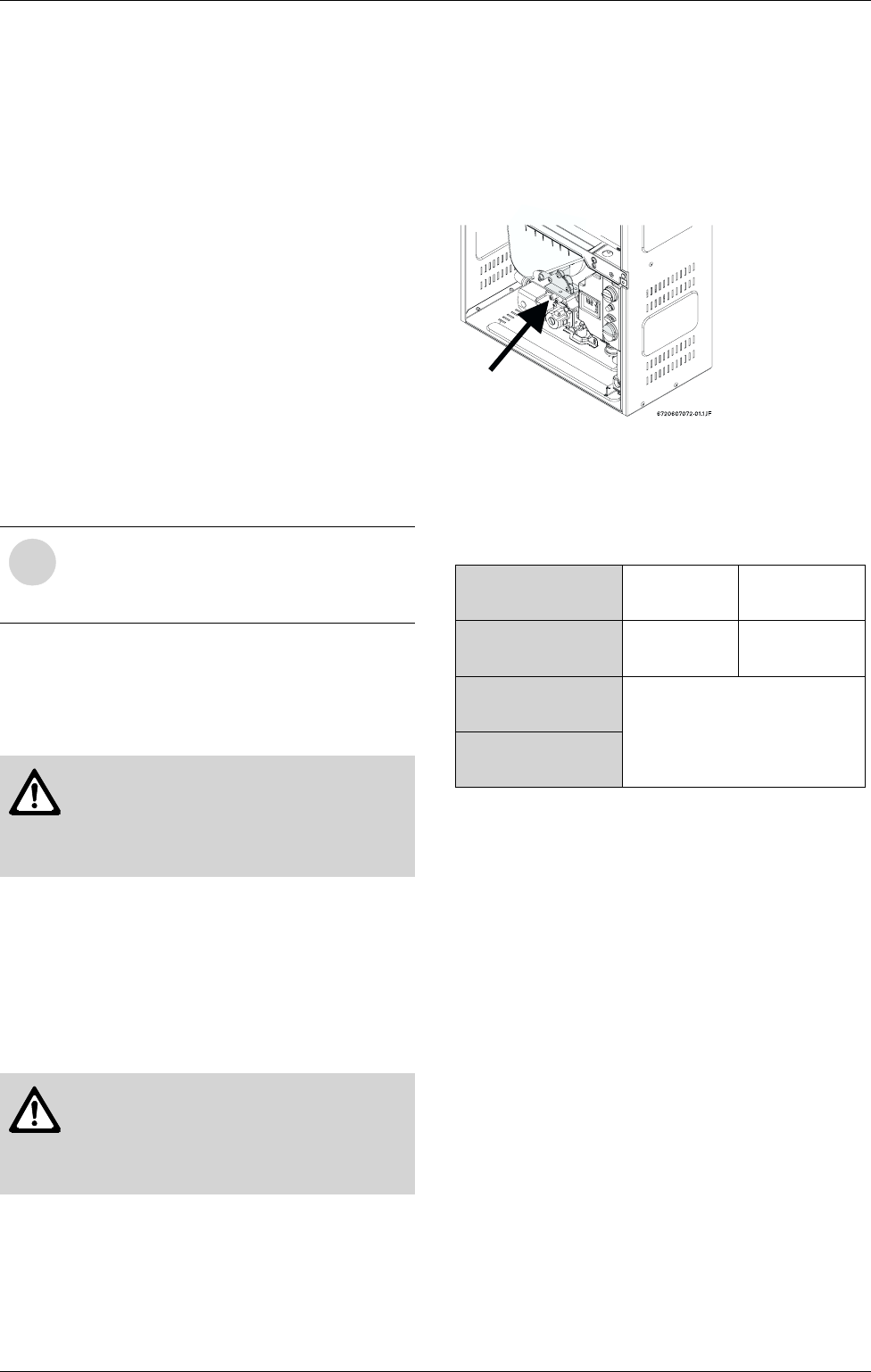
6 720 607 057
Appliance details
17
2.11 Gas line sizing
B It is strongly recommended that the Natural Gas pipe
be Black Iron pipe the entire distance from the
outside meter to the inlet of the gas connection. ¾”
Black Iron pipe up to 20 feet (6.1m) and 1” Black Iron
pipe up to 70 feet (21.34m) distances. Flex line is
NOT recommended, but if used, then oversize the
diameter of the flex pipe, keep the length to a
minimum and try to keep the flex line as straight as
possible.
B It is strongly recommended that the LP Gas pipe be
semi-rigid copper or Black Iron pipe from the outside
regulator to the inlet of the gas connection. For semi-
rigid copper piping: 5/8” up to 10 feet (3.05m) and
¾” up to 30 feet (9.14m) distances. For Black Iron
piping: ½” up to 20 feet (6.1m) and ¾” up to 80 feet
(24.38m) distances. Flex line is NOT recommended,
but if used, then oversize the diameter of the flex
pipe, keep the length to a minimum and try to keep
the flex line as straight as possible.
National Fuel Gas Code requires that a sediment trap
(drip leg) be installed on gas appliances not so
equipped. Also, a manual gas shut off valve must be
installed on the gas supply line within close proximity of
the water heater and be visible from the water heater.
The water heater must not be piped with gas supply
pressures in excess of 0.5 psig. If overpressure has
occurred, such as through improper testing of the gas
lines or malfunction of the supply system, the gas valve
must be checked for safe operation.
When connections are made, check for gas leaks at all
joints. Apply some soapy water to all gas fittings. Soap
bubbles are a sign of a leak.
2.12 Measuring gas pressure
To measure and verify if adequate gas pressure is being
delivered to the water heater, first run a high hot water
flow rate and operate other gas equipment on the same
load. Using a manometer, then measure the inlet gas
pressure at the inlet gas pressure test port. See Fig. 23.
Gas pressures lower than 5" W.C. for Natural Gas or
11" W.C. for LPG will result in insufficient degree rise
to the hot water being used. See Gas Connections,
chapter 2.10.
Fig. 23 Gas pressure measuring (left tapping)
HIGH ALTITUDE OPERATION
Due to the lower density of air at high altitudes, output
must be reduced in installations above 4,000 ft (1,219
m).
Burner output at altitudes greater than 4,000 ft (1,219
m) will be electronically reduced once the control board
has been properly adjusted.
i
THESE FIGURES ARE FOR 250 SX
SUPPLY ONLY, ALL OTHER
APPLIANCES IN THE BUILDING MUST
BE INCLUDED IN THE PIPE SIZING.
Warning: The heater must be
disconnected from the gas supply
piping system during any pressure
testing of that system at test pressures
equal to or more than 0.5 psig.
Danger: If you have a leak, shut off the
gas. Tighten appropriate fittings to stop
leak. Turn the gas on and check again
with a soapy solution. Never test for gas
leaks using a match or flame.
Altitude Natural Gas: Liquid
Propane:
0 - 4,000 ft
(0 - 1,219 m)
no
modification
no modification
4,000 ft - 8,000 ft
(1,219 m - 2,438 m)
contact CEC for detailed
instructions
Above 8,000 ft
(above 2,438 m)
Table 4


















